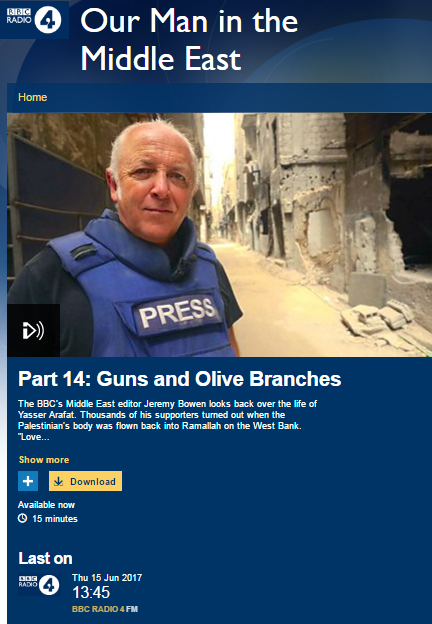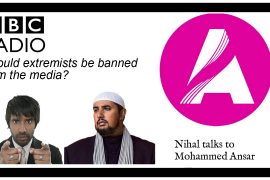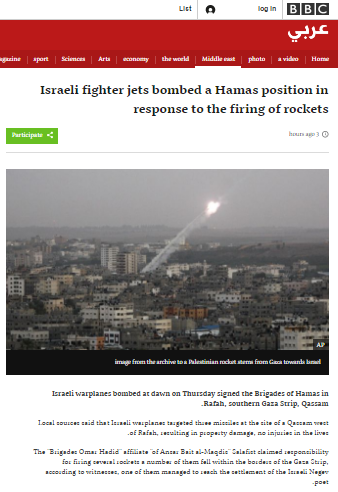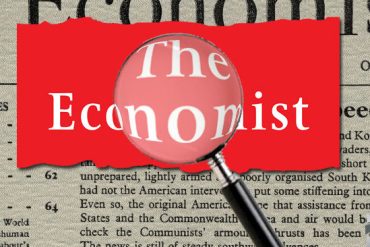Episode 14 of the ongoing BBC Radio 4 series ‘Our Man in the Middle East’ was devoted entirely to Jeremy Bowen’s portrayal of Yasser Arafat.
“The BBC’s Middle East editor Jeremy Bowen looks back over the life of Yasser Arafat. Thousands of his supporters turned out when the Palestinian’s body was flown back into Ramallah on the West Bank. “Love him or hate him, he was Mr Palestine,” says Bowen. “In death as well as in life he was the symbol of the Palestinian people and their struggle for independence – much more than a politician.” The Israeli Prime Minister Ariel Sharon’s view was that Arafat was ‘ a murderer and a pathological liar’.”
Originally broadcast on June 15th under the title “Guns and Olive Branches“, the programme now opens with notification that “this programme has been edited since broadcast” – but BBC audiences are not informed what that editing entailed and the BBC’s ‘corrections and clarifications‘ page does not include any related information.
The programme begins with Bowen’s recollections from November 2004 and an interpretation of Arafat’s sartorial propaganda that unquestioningly endorses the notion that the State of Israel is actually “Palestine”. [all emphasis in italics in the original]
“Even his keffiyeh – his black and white headscarf – carried a message. Arafat always wore it pushed back behind his left shoulder and down the front of his chest on the right, broad at the top, tapering down to the south: the shape of Palestine.” [emphasis added]
Listeners repeatedly hear Bowen refer to a Palestinian “struggle for independence” with just one brief and inadequately explained reference to the fact that the said “struggle” was actually intended to wipe Israel off the map and with no mention made of the absence of any claim to “independence” during the nineteen years that Palestinians lived under Jordanian and Egyptian occupation.
“Yasser Arafat, leader of the Palestinians since the 1960s, was one of the world’s most famous or notorious people – depending on you view of Palestinian nationalism. Love him or hate him, Yasser Arafat was Mr Palestine.”
“In death as well as life, Arafat was the symbol of the Palestinian people and their struggle for independence; much more than just a politician.”
“Yasser Arafat’s position as the human embodiment of Palestinian hopes for independence were [sic] sealed in 1974 when he was invited to address the United Nations.”
“Yasser Arafat was born in 1929 and spent most of his childhood in Cairo. He fought in the Arab-Israeli war in 1948 and went on to found Fatah – a group that wanted to destroy what it called the colonialist, Zionist occupation of Palestine.”
“His [Arafat’s] last three years, spent under siege by Israel in the wrecked Muqata in Ramallah, made him even more of a symbol of the Palestinian struggle for independence and freedom. Palestinians still don’t have a state.”
Listeners also hear repeated references to an ‘unequal’ conflict – with no explanation of the fact that the Palestinians were junior players in a wider conflict between the Arab states and Israel.
“Other, more cautious Palestinians called Arafat a madman at first because of his desire to take on the much stronger Israelis.”
“His critics said a wiser leader might have finished the job. But a wiser man might not have started such an unequal fight.”
Bowen erases the Arab League’s role in the creation of the PLO.
“Egypt’s president Nasser had founded the PLO to control Palestinian nationalists. Arafat used it to unite Palestinian factions, to campaign for international recognition and most of all, to fight Israel.”
Throughout the item Bowen refrains from describing Palestinian attacks against Israelis as terrorism in his own words and promotes the ‘one man’s terrorist is another man’s freedom fighter’ myth.
“Many Israelis regarded Arafat as an unreformed terrorist. They blamed him for decades of attacks, including the suicide bombs that had killed hundreds of Israeli civilians in his last few years.”
“Arafat was a prime mover behind many attacks. Fatah and other Palestinian factions shot, bombed and hijacked their way into the headlines. In 1972 Fatah gunmen calling themselves Black September killed 11 Israeli athletes and a German policeman at the Munich Olympic games.”
“Some Palestinians believed they were winning the argument that their cause was just. Other Palestinians said the armed struggle – terrorism in Israeli eyes – meant they could no longer be ignored.”
Listeners hear context-free references to the Six Day War, the Yom Kippur war and the first Lebanon war.
“His [Arafat’s] first attacks in the mid-1960s weren’t more than pin-pricks. But his moment came in 1967 in the months after Israel inflicted a crushing defeat in only six days on the armed forces of Egypt, Jordan and Syria.”
“The Middle East was boiling. The Palestinian-Israel conflict was at a new pitch and there was a full-scale war in 1973. Israel narrowly came out ahead.”
“They [Israel] invaded Lebanon in 1982 where the Palestinians had established what amounted to a mini-state.”
Bowen misrepresents the first Intifada as ‘non-violent’, erasing from audience view the Israelis murdered during that period of PLO orchestrated violence as well as some 1,000 Palestinians executed by their fellow Palestinians – with Arafat’s approval.
“What changed everything was entirely unexpected. In December 1987 an Israeli truck collided with a car, killing 4 Palestinians. Protests exploded into a full-blown uprising: the Intifada. Images of Palestinian children taking on tanks with stones went around the world and became a symbol of the oppression inherent in the occupation.”
“Palestinian rage and frustration exploded again in 2000 but this time there were armed clashes and unlike the first Intifada, the Palestinians lost the propaganda battle when suicide bombers killed many Israeli civilians.”
Bowen’s portrayal of the Oslo Accords era erases the Palestinian terrorism that immediately followed the signing of the agreement and fails to inform listeners of Arafat’s role in the pre-planned second Intifada terror war.
“But Israel and the Palestinians signed an historic peace deal and Arafat was allowed to live in the occupied territories.”
“The peace process was flawed for both sides but for a few years there was a lot of hope. Then the Israeli Prime Minister Yitzhak Rabin was assassinated by a Jewish extremist who wanted to kill the chance of peace as well.”
A recording of Saeb Erekat speaking in 2004 which further gives listeners an inaccurate impression of Arafat’s role in the campaign of terrorism that surged in the autumn of 2000 was selected by Bowen for inclusion in this programme..
Erekat: “I’m afraid if Mother Theresa were to be our president, Nelson Mandela were to be our prime minister, Martin Luther King to be our speaker and Mahatma Gandhi would be our chief negotiator, the Israelis would find a way to link them to terrorism and some voices in Washington would echo that. The question wasn’t Arafat.”
Throughout the item Bowen repeatedly promotes a romantic image of Arafat as a charismatic “revolutionary”.
“As Israelis settled into their occupation of the West Bank, Arafat took the fight to them, moving around in disguise and organising hundreds of attacks. Israel hit back in 1968 with a major military operation at the Karameh refugee camp in Jordan which had become a big Fatah base. […] The battle established Arafat’s legend. He was on the cover of Time magazine and the young revolutionary gave countless interviews.”
“For the first time posters of Arafat started appearing wherever there were Palestinians. They’d never had a leader with his charisma. By the summer of 1969 Arafat was chairman of the Palestine Liberation Organisation.”
“Arafat swaggered into the General Assembly in New York wearing combat fatigues and sunglasses. He delivered his most famous lines: ‘I come to you bearing an olive branch in one hand and a freedom-fighter’s gun in the other. Do not let the olive branch fall from my hand’. Arafat repeated that last warning three times. He was offering Israel a choice: peace or war.”
“The General Assembly gave him a standing ovation though among Arab leaders Arafat had plenty of enemies. He’d wanted to carry a pistol into the hall to make his point and had to be persuaded that an empty holster would do just as well. I remember the outrage among Jewish friends at my school in Cardiff that he’d even been allowed to speak. For Israelis, Arafat was an arch-terrorist and his olive branch was a joke.”
“Arafat was caught between his obligations under the peace process – satisfying the Israelis and the Americans – and his self-image as a revolutionary focusing the frustration and anger of his people.”
“It was always strange being in the same room as one of the most famous faces in the world. His legend was always there with him to be deployed at all times for his dream of Palestine. If being the human form of so many people’s’ hopes was a burden – and it must have been – he didn’t show it.”
Bowen’s own view of Arafat is further clarified at the end of the item.
“Back in 2004 outside the hospital in Paris where Arafat was dying, I felt that for all his weaknesses, his unique position as the father of his nation gave him a strength that genuine peace-makers would miss.
Recording Bowen: Yasser Arafat may have been part of the problem over the years but he’s also been part of the solution as well. And when he finally goes, his enemies – the Israelis and the Americans who’ve tried to isolate him – may find that far from it being easier to reach some kind of stability in the Middle East, it may even be more difficult.”
Bowen completely whitewashes Arafat’s cultivation of the culture of personal and organisational corruption that hallmarked the Palestinian Authority under his rule, as well as his funding of terrorism.
“Arafat preferred yes-men to straight talkers, tolerated corruption and he wasn’t much interested in the nitty-gritty of building a state. But for most Palestinians he was a national icon.”
Similarly, Bowen whitewashes Mahmoud Abbas’ incitement and glorification of terrorism.
“Abbas has never had Arafat’s charisma and even though he’s condemned Palestinian violence many times, the current Israeli government says he’s not a partner for peace.”
One of the more egregious parts of this programme comes towards its end when Bowen resuscitates an old canard:
“Some say Arafat was poisoned by Israel. His body was exhumed and tests found high levels of radioactive Polonium in his remains. The results were not conclusive but most Palestinians are convinced.”
As Bowen knows full well, those “high levels” of Polonium were pronounced by experts who tested them to be “of an environmental nature”. Both the French and Russian investigating teams ruled out foul play and the investigation closed two years ago, with the French prosecutor saying “there is no case to answer regarding the death of Palestinian leader Yasser Arafat”.
Nevertheless, the man whose job description is to “make a complex story more comprehensive or comprehensible for the audience” dishonestly promotes the notion that “the results were not conclusive”, thereby suggesting to BBC audiences that long-standing but entirely unproven Palestinian messaging on that topic may not, after all, be baseless propaganda.
Once again, Jeremy Bowen’s standards of adherence to BBC editorial guidelines on accuracy and impartiality are on full view in this programme – together with some revealing insights into his own views of a man responsible for the deaths of thousands of Israelis and Palestinians.
Related Articles:
BBC report that breached impartiality rules still intact online 12 years on
BBC News report whitewashes Arafat’s terrorism
Arafat ‘poisoning’ case closed: an overview of 3 years of BBC News coverage
BBC ME editor recycles his ‘Israeli Right killed the peace process’ theory





Bowen – one of the BBC prime woke journalists – a faker